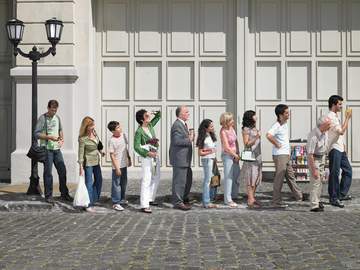What to KnowThe words cue and queue are pronounced the same, but usually have different meanings. Cue most often refers to a hint, or to a signal given to a performer (‘I forgot my line, and had to be given a cue from the stage manager’). Queue most often refers to a succession of things, such as people waiting in a line (‘the show was very popular, and there was a long queue outside the theater every night’).

It can be tricky to tell the difference between cue and queue, as they are pronounced in the exact same way (like the letter Q). However, there are notable difference between these words, when each is used as a noun or as a verb. Let’s look at each one first as a noun.
Cue as a noun
The most common meanings of cue, used as a noun, are “a signal to a performer to begin a specific speech or action”, “a feature indicating the nature of something perceived,” and “a hint.” Here are some examples:
When yet another guest threw a glass of wine in my face I took this as a cue to depart.
The famous actor was well-known for fumbling his lines, and often had to rely on cues to help him remember them.
Many poker players focus on the subtle visual cues they get from their opponents before making bets.
Queue as a noun
The most common uses of queue as a noun are “a waiting line especially of persons or vehicles” and “a sequence of messages or jobs held in temporary storage awaiting transmission or processing.” The first of these is mainly used in British English, and the second one is mainly found in reference to computers. Here are some examples of queue:
It was cold and rainy, but the show was so popular that no one seemed upset to spend two hours in the queue outside the theater.
The printer is once again broken, and keeps switching up the items in the queue.
Cue and Queue as verbs
Both cue and queue function as verbs, with meanings that relate to the ones they have as nouns: cue can mean “to give a prompt to,” and queue can mean “to arrange or form in a line (or a queue).”
She cued the band to begin, but they did not notice her.
Every night we queue outside the theater, hoping to get tickets, but the band never notices us.
Each word has additional meanings: cue can also refer to a stick used to play pool or billiards, and queue can refer to a braid of hair that hangs down the back of the head. For the more commonly-encountered meanings, try to remember to use cue when referring to hints, suggestions, and information, and to use queue when referring to things that organize into lines.




